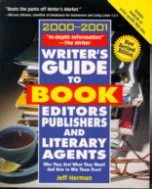Insider Tricks to Getting Published: Part I
by Jeff Herman
 Ordering information:
Ordering information:Amazon.com |
It's possible that you. or people you know, have already run into this frustrating roadblock. You may also be familiar with the rumor that it's more difficult to get an agent than it is to get a publisher-or that no agent will even consider your work until you have a publisher. On the surface, these negatives make it seem that you would have a better shot at becoming a starting pitcher for the Yankees, or living out whatever your favorite improbable fantasy might be.
But, as you will soon learn, these so-called policies and practices are often more false than true. Especially if you develop creative ways to circumvent them.
I have dubbed the above obstacle course the Battle of the UNs. If you're presently unagented/unsolicited, you're one of the UNs. Welcome! You're in good company. Nobody is born published. There is no published author who wasn't at one time an UN. Thousands of new books are published each year. and thousands of people are needed to write them. You can be one of them.
In this chapter I'll show you how to win the Battle of the UNs. But first let me clarify an important distinction. When I use the word win here, I don't mean to say that you'll necessarily get your work published. What I mean is: You'll gain reasonable access to the powers-that-be for your work, and you'll learn how to increase the odds- dramatically-that your work will in fact be acquired. Please be realistic. For every published writer, there are, at minimum, several thousand waiting in line to get published. "Many are called, but few are chosen."
It's completely within your power to maximize your chances of getting published. It's also within your power to minimize those chances. There are reasons why some highly talented people habitually underachieve, and those reasons can often be found within them. If you fail, fail, and fail, you should look within yourself for possible answers. What can you do to turn it around? If you find some answers, then you haven't failed at all, and the lessons you allow yourself to learn will lay the groundwork for success in this and in other endeavors.
Having an agent greatly increases the likelihood that you will be published. For one thing, on the procedural level, an established agent can usually obtain relatively rapid (and serious) consideration for his or her clients. One basic reason for this is that editors view agents as a valuable screening mechanism-that is, when a project crosses the editor's desk under an agent's letterhead, the editor knows it's undergone vetting from someone in the industry who is familiar with the standards of quality and market considerations.
I usually recommend that unpublished writers first make every attempt to get an agent before they start going directly to the publishers. It's significantly easier to get an agent than it is to get a publisher-not the other way around. Most agents I know are always on the lookout for fresh talent. Finding and nurturing tomorrow's stars is one of our functions.
However, one of my reasons for writing and researching this book is to reveal to you that, as a potential author, not having an agent does not necessarily disqualify you from the game automatically. Before I show you ways to win the Battle of the UNs. I'd like you to have a fuller understanding of the system.
You Are the Editor
Imagine that you're an acquisitions editor at one of America's largest publishing firms in New York City. You have a master's degree from an Ivy League college and you, at least, think you're smarter than most other people. Yet you're earning a lot less money than most of the people who graduated with you. Your classmates have become lawyers, accountants. bankers, and so forth, and they all seem to own large, well-appointed apartments or homes-whereas you, if you fall out of bed, might land in the bathtub of your minuscule New York flat.
On the other hand, you love your job. For you. working in publishing is a dream come true. As in other industries and professions, much of your satisfaction comes from advancement -- getting ahead.
To move up the career ladder, you'll have to acquire at least a few successful titles each year. To find these few good titles, you'll be competing with many editors from other publishers and perhaps even with fellow editors within your own firm. As in any other business, the people who make the most money for the company will get the choice promotions and the highest salaries. Those who perform less impressively will tend to be passed over. (Of course, being a good editor and playing politics well are also important.)
There are two tried-and-true sources for the titles that publishers acquire: literary agents and direct solicitations.
Literary Agents
As an editor on the move, you'll cultivate relationships with many established literary agents. You'll want them to know what you like and what you don't like. And, by showing these agents you're disposed to acquiring new titles to build your position in the company, you'll encourage these agents to send you projects they think are right for you.
When you receive material from agents, you usually give it relatively fast consideration -- especially if it's been submitted simultaneously to editors at other houses, which is usually the case. When something comes in from an agent, you know it's been screened and maybe even perfected. An established agent rarely wastes your time with shoddy or inappropriate material. They couldn't make a living that way because they'd quickly lose credibility with editors.
Direct Solicitations
If you're an ambitious editor, you won't just sit back passively and wait to see what the agents might bless you with. When you're resourceful, the opportunities are endless. Perhaps you'll contact your old American history professor and ask her to do a book showcasing her unique perspectives on the Civil War.
Or maybe you'll contact that young fresh fiction writer whose short story you just read in a leading literary journal. You might even try reaching that veteran United States senator who just got censured for sleeping with his young aides.
One place you'll tend not to use is the "slush pile." This is the room (more like a warehouse) where all the unagented/unsolicited submissions end up. Looking through the slush pile isn't a smart use of your limited time and energy. The chances that anything decent will be found there are much less than one percent. You have less-than-fond memories of your first year in the publishing business, when, as an editorial assistant (which was basically an underpaid secretarial job), one of your tasks was to shovel through the slush. Once in a great while, something promising could be found; but most of the stuff wasn't even close. At first, you were surprised by how unprofessional many of the submissions were. Many weren't addressed to anyone in particular; some looked as if they had been run over by Mack trucks; others were so poorly printed they were too painful for tired eyes to decipher -- the list of failings is long.
No. The slush pile is the last place -- or perhaps no place -- to find titles for your list.
Now you can stop being an editor and go back to being whoever you really are. I wanted to show you why the system has evolved the way it has. Yes, though it's rational. it's cold and unfair: but these qualities aren't unique to publishing.
You're probably still wondering when I'm going to get to that promised modus operandi for winning the Battle of the UNs. Okay, we're there.
Out of the Slush
The following steps are intended to keep you out of the infamous slush pile. Falling into the slush is like ending up in jail for contempt of court; it's like being an untouchable in India; it's like being Frank Burns on M*A*S*H. My point is that nobody likes the Slushables. They're everyone's scapegoat and nobody's ally. Once your work is assigned to the slush pile, it's highly unlikely that it will receive effective access. Without access, there can be no acquisition. Without acquisition, there's no book.
Look for Part II in our next issue!
 **Literary agent Jeff Herman founded The Jeff Herman
Agency, LLC, in 1987 while still in his twenties. The
agency has expanded rapidly since then, and
has sold more than 350 titles. Herman's agency has established a strong presence in
general adult nonfiction, including business, reference,
commercial self-help, computers, recovery/healing and
spirituality.
Herman's notable clients include bestselling authors
Dave Pelzer, Jack Canfield, and Mark Victor Hansen,
authors of Chicken Soup for the Soul, the #1
New York Times bestseller which has launched a host
of sequels and football great Joe Montana.
Herman speaks throughout the country about how to get
published. He has been written about in many books and publications,
including Success, Entrepreneur, and
Publisher's Weekly.
He has appeared on numerous television and radio shows.
Herman graduated from Syracuse University with a
Bachelor of Science degree in consumer economics.
He is a member of the Association of Author Representatives
and the National
Speakers Association.
**Literary agent Jeff Herman founded The Jeff Herman
Agency, LLC, in 1987 while still in his twenties. The
agency has expanded rapidly since then, and
has sold more than 350 titles. Herman's agency has established a strong presence in
general adult nonfiction, including business, reference,
commercial self-help, computers, recovery/healing and
spirituality.
Herman's notable clients include bestselling authors
Dave Pelzer, Jack Canfield, and Mark Victor Hansen,
authors of Chicken Soup for the Soul, the #1
New York Times bestseller which has launched a host
of sequels and football great Joe Montana.
Herman speaks throughout the country about how to get
published. He has been written about in many books and publications,
including Success, Entrepreneur, and
Publisher's Weekly.
He has appeared on numerous television and radio shows.
Herman graduated from Syracuse University with a
Bachelor of Science degree in consumer economics.
He is a member of the Association of Author Representatives
and the National
Speakers Association.
Known as one of the most dynamic and innovative
agents in the business, Herman is also the author of the
annual bestselling book, the 2000-2001 Writer's Guide to
Book Editors, Publishers and Literary Agents (Prima
Publishing), You Can Make it Big Writing Books
(Prima Publishing), and How to Write a Book Proposal:
15 Proposals that Worked and Why! (John Wiley).
Return to the March 2000 issue of The IWJ.
